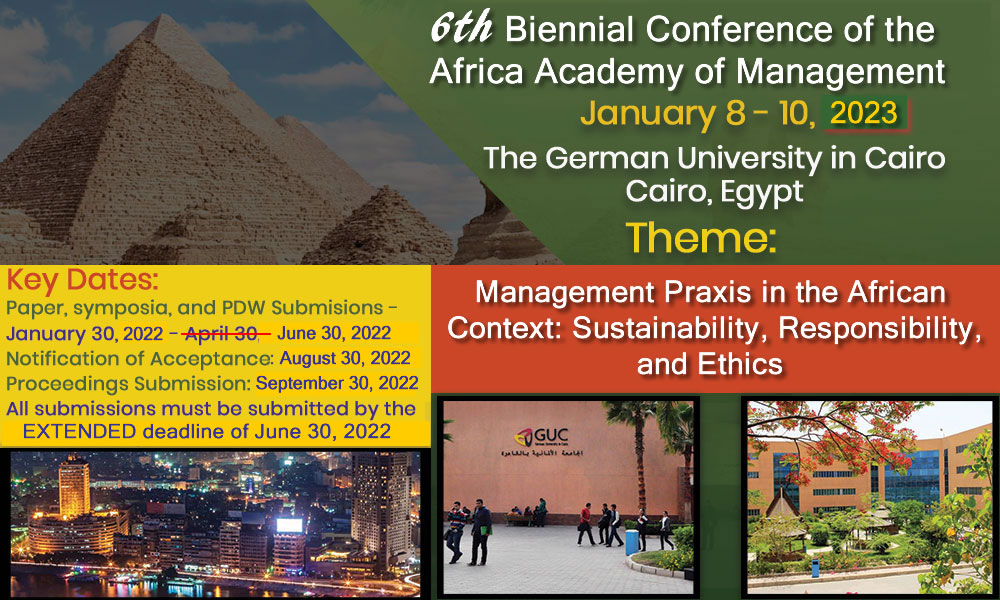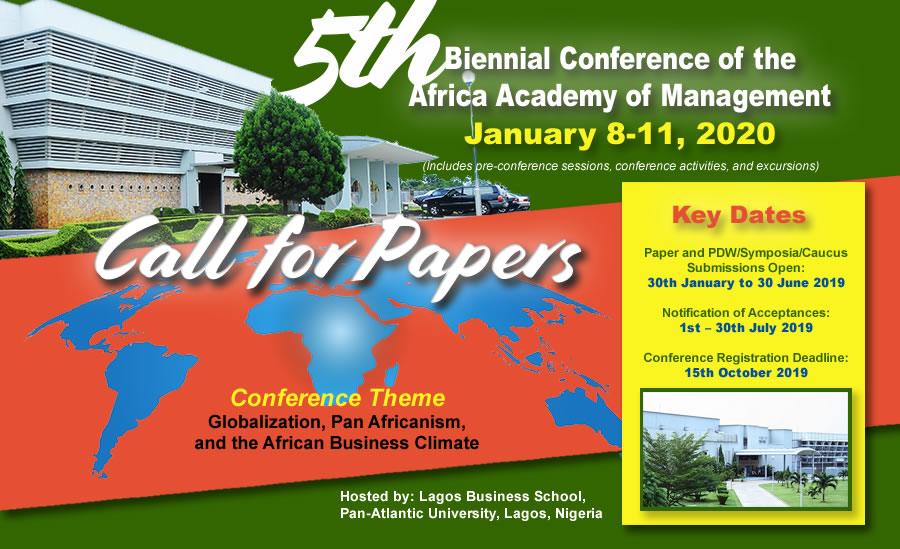AFAM Biennial Conference
Welcome to Biennial Conference of the Africa Academy of Management (AFAM).
-
7th Biennial Conference - Cape Town 2024
January 8, 2024 – January 10, 2024Globalization and digitalization are having a transformative effect on the nature and organization of work as organizations strive to adapt to the competitive pressures unleased by these twin environmental forces. For many organizations, adapting to these pressures has entailed the adoption of new business models as they strategize to explore and exploit the threats and opportunities in the increasingly changed environment. Additionally, digitilization has engendered new forms of work organization and altered long standing employment conditions.
-
6th Biennial Conference - Cairo 2023
January 8, 2023 – January 10, 2023
As we usher in a new decade, our nations, institutions, and communities are facing grand challenges that include the impact of climate change, corruption, poor governance, persistent inequality, and political instability which collectively, define the context of management education and practice. In considering the theme of management praxis through the lens of sustainability, responsibility, and ethics, our aim is to explore answers to questions such as:
- What role does management education play in preparing responsible and ethical leaders?
- How are African institutions and organizations responding to, and preparing for, the realities and challenges of climate change and other grand challenges?
- How can African countries and communities become resilient in the face of the volatile, uncertain, and complex environment in which we are living?
- How are different types and sizes of businesses in the continent responding to, and mitigating against climate change? How are they engaging their various stakeholders in their sustainability efforts?
- In what ways can leadership development help to prepare responsible ethical leaders?
- How is sustainability and ethics reflected in public policies in Africa? How can public policy initiatives advance sustainability in management education and practice in the continent?
- What is the role of African leaders and managers in addressing inequalities based on gender, ethnicity, class and sexual orientation? How can management help governance in Africa through leadership, values, ethics, and culturally-appropriate practices to transform the African enterprise?
The conference will be organized around the following tracks:
- Organizational Behavior and Human Resource Management
- Strategy and International Management
- Entrepreneurship and Small Business
- Social Issues in Management
- Sustainability and Green Management
- Management Practice
- Public Policy, Administration and Non-Governmental Organizations
-
5TH BIENNIAL CONFERENCE - Nigeria 2020
January 8, 2020 – January 11, 2020
We are pleased to announce that the fifth biennial conference of the African Academy of Management (AFAM) will take place from January 8-11, 2020 at Lagos Business School in Lagos, Nigeria. Our conference theme is designed to look at two aspects of the ‘new’ emerging business environment in Africa: 1) how external actors invest, relocate, and interact with indigenous African businesses and 2) how internal African businesses move across national boundaries and explore the Pan-African environment.
Conference Theme: Globalization, Pan Africanism, and the African Business Climate
Our conference theme is meant to encourage dialogue and debate regarding one of the most pressing issues that face the continent: As African economies grow, how are resources and business opportunities best marshalled and shepherded for the benefit of Africans in a way that facilitates sustainability and access to better life for citizens? What is the role of foreign direct investment, regional trade associations, and regulatory frameworks in ensuring and maximizing resources? How can the public and not-for-profit ‘third sector’ help to manage and to benefit from the inevitable challenges and changes? What are the responsibilities of investors, both those in Africa and those from outside Africa, in ensuring a sustainable and healthy environmental footprint in African businesses and economies?
Our location, Lagos, Nigeria, is ideal for exploring these issues. Nigeria is not only the largest economy in Africa but also the largest oil producer in Africa, the 11th largest in the world, and has a long history of FDI. As new oil deposits continue to be discovered throughout the continent, we may ask ourselves if oil (and the other critical resources so prevalent in Africa) are a cure or a curse? How might African countries rich in natural resources best manage this wealth for the benefit of their populations?
Prospective contributors are encouraged to submit conceptual or empirical papers, symposia and professional development workshops that explore the issues relevant to the conference theme and beyond. Topics relevant to the theme include, but are not limited to the following:
- How can foreign direct investment be best managed in the African context?
- How can African regional actors compete with international firms?
- How can local firms be encouraged to globalize, and/or expand across the African continent?
- What frameworks might be employed to manage natural resources on the continent?
- What formal institutional factors facilitate or impede the creation of African organizations that can compete in the global economy?
- How might resources be better managed for the benefit of Africans?
- How might entrepreneurship be promoted to encourage indigenous resource development?
- What are effective incentives and frameworks for CSR and social entrepreneurship?
- What strategies should African businesses implement in their local markets to enable them to prosper both at home and in the competitive global environment?
- What factors could facilitate (or impede) the emergence of African multinationals?
- What is the role of African indigenous knowledge systems in contributing to management theory development?
- To what extent can informal institutional factors, such as culture, ubuntu, and the role of the extended family system facilitate or impede the creation of entrepreneurial businesses in Africa?
- What human resources management practices can facilitate the creation of high-performing organizations?
SPONSORS



